2019 Women in Public Service Conference
Register for the 11th annual Women in Public Service Conference on September 19 & 20, 2019 in Portsmouth, Virginia. Registration is now available online.
Register for the 11th annual Women in Public Service Conference on September 19 & 20, 2019 in Portsmouth, Virginia. Registration is now available online.
Virginia Department of Fire Programs’ State Fire Marshal Office Stresses Safety First During the Fourth of July Holiday
Don’t Get Burned. Leave the Fireworks to the Professionals.
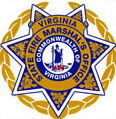
GLEN ALLEN – The Virginia Department of Fire Programs’ (VDFP) State Fire Marshal’s Office reminds Virginia residents and visitors that operating fireworks is extremely dangerous – let professionals handle the fireworks this Fourth of July holiday weekend.
“Around this time of year, an increase in burns to hands, fingers, and arms occurs due to the mishandling of fireworks by consumers,” said VDFP Executive Director Michael Reilly. “There are more adverse effects from handling fireworks improperly that residents don’t consider, such as the start of fires and excessive noise. The safest way to celebrate the holiday with fireworks is to visit a professional fireworks show.”
According the 2018 Fireworks Annual Report by the Consumer Product Safety Commission, there were a reported five deaths from the direct impacts of fireworks. An estimated 5,600 fireworks-related injuries were treated across the U.S. during June 22 and July 22. In that four-week span, children ages 10 to 14 years of age suffered the most fireworks-related injuries. Teens ages 15 to 19 had the second highest rate of injuries.
“We also emphasize that the possession of and selling illegal fireworks in Virginia is a criminal offense,” said Deputy State Fire Marshal Steven Sites. “The State Fire Marshal’s Office confiscated nearly 2,000 illegal fireworks in Virginia by the Fourth of July holiday in 2018. Remember that illegal fireworks are illegal for proven and sensible reasons.”
Only “permissible fireworks,” as defined in the Code of Virginia, can be legally sold, possessed or used within the Commonwealth. A list of permissible fireworks can be viewed here. The fireworks listed in this document have been field tested to compare the items to the performance criteria of the American Fireworks Standards Laboratory (AFSL). Permissible fireworks may also be further limited in different localities. Check local ordinances as well as the Statewide Fire Prevention Code prior to purchasing and utilizing fireworks. In general, any firework that explodes, moves on the ground or in the air, or shoots a projectile is illegal.
The sale, possession and /or use of any fireworks not classified as permissible is prohibited. Violations can be prosecuted as a Class I Misdemeanor, punishable by a fine not to exceed $2,500 and/or up to one (1) year in jail. Any illegal fireworks can be confiscated by authorities. Many localities prohibit the sale, possession or use of all fireworks.
Fire and law enforcement officials will be working over the holiday to ensure the safety of Virginia’s residents and visitors.
If you do use permissible fireworks, follow these important safety precautions:
About the VDFP
The Virginia Department of Fire Programs provides training, support services, and resources to more than 700 fire and emergency service organizations, and approximately 44,000 fire service personnel in the Commonwealth. Support areas include funding, professional development, research, operational support, technical assistance, and fire prevention inspections through its State Fire Marshal Office.
The 2019 Virginia General Assembly Legislative Session lasted 46 days this year and brought over 3,000 bills and resolutions with nearly 1,900 going to Governor Northam for action.
Fire Programs pursued three bills and tracked a total of 18 bills and resolutions that affect Virginia’s Fire Service. Here is a list of the 11 bills and one resolution that go into effect on Monday, July 1.
*Note: The bill otherwise known as the “cancer bill” among Virginia’s Fire Service will be revisited during the 2020 Legislative Session and is under review by the Joint Legislative Audit and Review Commission (JLARC).
Resolution:
VDFP Bills:
Additional Virginia Fire Service Bills:
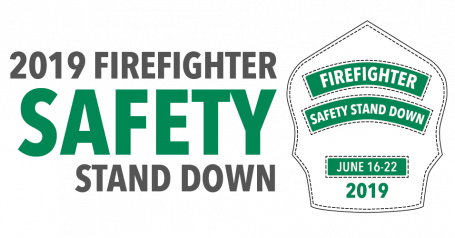
Cancer risk prevention and education are critical in today’s fire service. It can mean saving the lives of personnel who put their lives at risk for others daily. Firefighter Safety Stand Down is a risk reduction program that brings awareness and attention to the harsh byproducts of a rewarding and special profession.
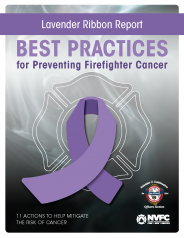 The Virginia Department of Fire Programs will join in participating in 2019 Firefighter Safety Stand Down, a joint initiative of the International Association of Fire Chiefs (IAFC) and the National Volunteer Fire Council (NVFC). The theme of Safety Stand Down 2019 focuses on reducing exposure risks and implementing the cancer prevention recommendations in the Lavender Ribbon Report. Many fire departments and organizations have developed training, resources, and videos related to this critical topic.
The Virginia Department of Fire Programs will join in participating in 2019 Firefighter Safety Stand Down, a joint initiative of the International Association of Fire Chiefs (IAFC) and the National Volunteer Fire Council (NVFC). The theme of Safety Stand Down 2019 focuses on reducing exposure risks and implementing the cancer prevention recommendations in the Lavender Ribbon Report. Many fire departments and organizations have developed training, resources, and videos related to this critical topic.
VDFP will provide topics daily through June 22, here on the VDFP website and on social media, which you may utilize for informational and training purposes to help educate members of your respective agencies. We will also include a few other current health and safety topics that are concerns within the public safety community today.
The first resource we offer is the Lavender Ribbon Report, which was jointly released by The International Association of Fire Chiefs’ Volunteer and Combination Officers Section (VCOS) and the National Volunteer Fire Council (NVFC). This report outlines actions that firefighters can take to reduce risk factors of cancer in the fire service.
In 2018, HB1170 was passed, allowing fire companies as defined in §27-6-01 or volunteer emergency medical services agencies as defined in §32.1-111.1 that is recognized by an ordinance to be part of the safety program of a county, city, or town to utilize state contracts to directly purchase motor fuel from the Virginia Department of General Services without seeking approval from the governing body of such county, city or town.
For more information regarding the benefits of these contracts and how to purchase from them, please contact your Local Government Account Executive. Learn more.
Click HERE to find out more
Registration is available now through FSTRS. Registration closes when the class is filled or on October 18, 2019.
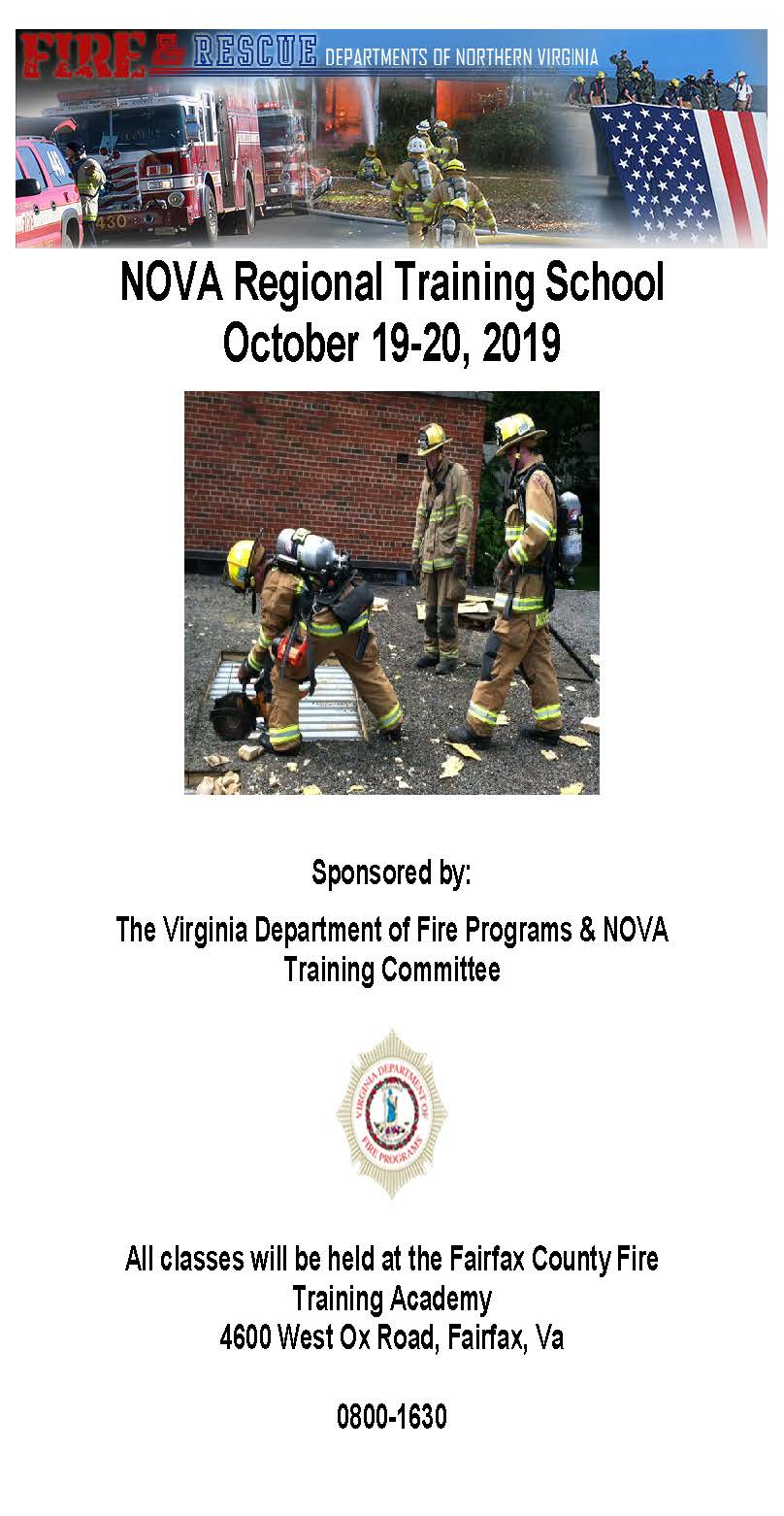
June 2-8, 2019 is recognized as Fire and Emergency Medical Services Memorial Week in Virginia. Take a moment this week to acknowledge Virginia’s fire and EMS personnel who devoted their lives and careers to protecting the Commonwealth.
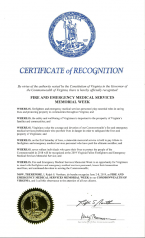
WHEREAS, firefighters and emergency medical services personnel play essential roles in saving lives and protecting property in communities throughout Virginia; and
WHEREAS, the safety and well-being of Virginians is important to the prosperity of Virginia’s families and communities; and
WHEREAS, Virginians value the courage and devotion of our Commonwealth’s fire and emergency medical services professionals who put their lives in danger in order to safeguard the lives and property of Virginians; and
WHEREAS, on the first Saturday of June, a statewide memorial service is held to pay tribute to firefighters and emergency medical services personnel who have paid the ultimate sacrifice; and
WHEREAS, seven valiant individuals who gave their lives to protect the people of the Commonwealth in 2018 will be recognized at the 2019 Virginia Fallen Firefighters and Emergency Medical Services Memorial Service; and
WHEREAS, Fire and Emergency Medical Services Memorial Week is an opportunity for Virginians to stand with firefighters and emergency medical services personnel, honor their tremendous sacrifices, and continued devotion to serving the Commonwealth;
NOW, THEREFORE, I, Ralph S. Northam, do hereby recognize June 2-8, 2019, as FIRE AND EMERGENCY MEDICAL SERVICES MEMORIAL WEEK in our COMMONWEALTH OF VIRGINIA, and I call this observance to the attention of all our citizens.